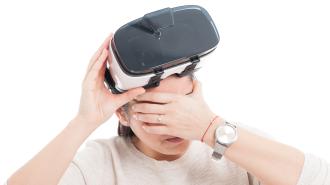A small study has found that playing “joyful” music can reduce the symptoms of cybersickness from virtual reality (VR) — suggesting a straightforward way to help more people take advantage of the tech’s many applications.
The challenge: As many as two-thirds of people using VR experience cybersickness, with symptoms like nausea, headaches, sweating, and dizziness.
If that merely meant some people couldn’t play games in VR, it might not be such a big deal, but VR has great promise for countless applications for work, education, and healthcare, and as hardware gets cheaper and lighter, we could see even more uses in the future.
“Joyful” and “calming” music both reduced the intensity of nausea-related symptoms of cybersickness.
What’s new? Researchers at the University of Edinburgh have now published the results of a small study that found playing calming or joyful music during a VR experience can reduce the symptoms of cybersickness.
The team reached this conclusion by having 39 people experience three virtual roller coaster rides designed to trigger cybersickness. One ride was completed in silence, one was accompanied by joyful music, and the third was soundtracked by calming music.
The study participants completed a survey in VR to rate their cybersickness symptoms after each ride. Based on those ratings, both types of music reduced the intensity of nausea-related symptoms, and the joyful music reduced the intensity of cybersickness overall.
Brain scramblies: While the participants completed the cybersickness survey, eye-tracking software was used to measure their reading speed and pupil size. Before leaving VR, the virtual coaster riders also completed tasks designed to test their memories and reaction times.
Based on those results, cybersickness appeared to temporarily decrease working memory and pupil size, and significantly slowed reaction times and reading speeds — emphasizing the need to minimize it if people want to take full advantage of the future of VR.
We’d love to hear from you! If you have a comment about this article or if you have a tip for a future Freethink story, please email us at [email protected].






